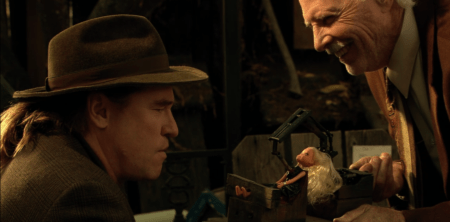366 Weird Movies may earn commissions from purchases made through product links.
DIRECTED BY: David Mackenzie
FEATURING: Eva Green, Ewan McGregor, Stephen Dillane, Ewen Bremner, Denis Lawson, Connie Nielsen
PLOT: Epidemiologist Susan and chef Michael meet and begin to fall in love, but their romance is complicated by a slowly unfolding global pandemic that methodically strips the human race of its physical senses.

COMMENTS: Hey, remember the COVID pandemic? Wasn’t that a ton of fun? We learned—and perhaps are continuing to learn—a whole lot about how our society would react to a worldwide health crisis, and the answers involve far more skepticism, selfishness, and general ignorance than we might have preferred. So there’s nothing quite like watching a movie in which the protagonists don masks to try and prevent the spread of an airborne virus that is threatening the entire world. Such happy memories come rushing back!
It seems that the cinema was prescient about such things about a decade before we got the real deal. Audiences had recently been treated to the horrors of outbreaks in films such as I Am Legend, Quarantine, Carriers, and (heaven help us) The Happening. One, Blindness, even focused specifically on a health crisis that deprived the populace of one of its senses. And in the year 2011, you had a choice: get a glimpse of the near-total failure of our public infrastructure in Steven Soderbergh’s thriller Contagion, or deal with the effects such a worldwide disaster would have on a budding romance in Perfect Sense, a love story suffused with foreboding and melancholy.
Diseases often propagate by preying upon our desire to help and comfort one another. But the contagion in Perfect Sense is unusually cruel, by turns capitalizing on our natural inclination to be kind toward one another, then exposing us at our most primal and emotional level, and finally stripping away that which allows us to interpret and enjoy the world. The film finds a particular power in images of the populace as a whole suddenly losing all control and self-possession, overcome by bouts of rage, despair, or even gluttony and pica. In each case, people try to pick up the pieces as best they can, and director Mackenzie and screenwriter Kim Fupz Aakeson envision these victims reaching out to each other to fill the ensuing losses with hope, which is a welcome grace note in a film about the encroaching end of the world.
The story of this ever-evolving sickness is an odd counterpoint to the more intimate tale of two people who are rotten at love but find each other. Green and McGregor have terrific chemistry, impressive considering they are introduced to us as particularly poor romantic prospects: she’s an emotionally unavailable pessimist and he’s a frictionless cad. They have a genuinely effective, character-driven meet cute, and despite the obvious nature of their jobs—she works with diseases, his job revels in the senses of taste, smell, and sight—they act as worthy avatars for the damned human race. Just as their fellow humans find ways to go on, so do Susan and Michael keep after their mutual attraction, determined to hang on to their story even as the world falls apart.
The central figures in our story are so strong that it can be frustrating when the movie cuts away to share the ongoing collapse of the human race, complete with an omniscient narrator to explain “what it all means.” Unlike it’s cousin Contagion, which juxtaposes personal stories of survival against the global effort to defeat the pandemic, Perfect Sense works best at the micro level, with Susan and Michael navigating the crisis alongside their relationship with their friends and family. (McGregor also gets two reunions of a sort, with a fellow chef portrayed by his Trainspotting co-star Bremner, while his boss at the restaurant is none other than his own uncle Lawson, with whom he also shares a Star Wars pedigree.)
It’s only in the peculiar landscape of Perfect Sense that the closing moments of the film could be considered in any respect a happy ending: the world overtaken by a wave of unreserved euphoria, followed by Susan and Michael realizing the depth of their feelings and racing through the streets of Glasgow toward a heartfelt embrace—at the precise moment that their ability to see is snatched from them. Humanity won’t be long for this world, and all they will have is the sensation of this final, passionate embrace, but they will have that. It’s a dark but oddly hopeful conclusion regarding the one thing we learned for certain during the course of the pandemic: we humans are nothing if not persistent.
WHAT THE CRITICS SAY:
(This movie was nominated for review by Erin. Suggest a weird movie of your own here.)




